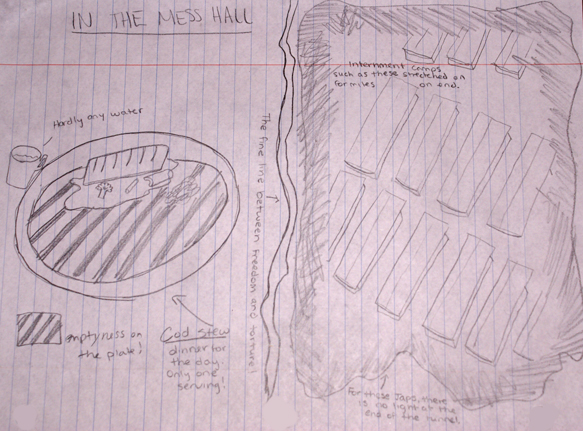![]()

Weedflower
Students' Voices
Two groups of 8th-grade students in Ms. Hunt's Pre-Advanced Placement Language Arts class at Emily Gray Junior High School in Tucson, Arizona conducted literature circles online. They used Wikispaces as their meeting place and assumed roles and responsibilities for various aspects of the wiki. Their focus was on exploring how the setting (time and place) affected the mood and tone of the story. These are excerpts from their postings and discussions and one student's original drawing.
Catherine was the "literary expositor" for her group. Her role was to select powerful passages from the book and share her connections and ideas about why she chose them.
Page: 112, Paragraph: 2, Line: 1
Passage: "Kids were eating with one another instead of with their families; many of the tables seemed arranged by age rather than family units. She looked around with interest. There were even a couple of tables with kids about her age."
Reason: I chose this passage because I think that it's kinda sad that the families don't sit together. I think that they really need each other the most during that tough time. I just think that it seems better if they all sat with their families. I would definitely want to sit with my family if I were them.Page: 113, Paragraph: 6, Line: 4
Passage: "That night many of the kids, including Sumiko, slept with their cots under the stars. It was cooler outside, and the night breeze made you feel almost less than hot. The leaves from the surrounding mesquite trees hit dryly against one another. The moon has never seemed brighter."
Reason: When I read this part, I had this really great picture in my head. I imagined myself in the camp, sitting outside on the cot. I could almost feel the breeze in the night. I could see myself laying outside and listening to the leaves. I could see the moon in my head, too. It just seemed like a really good sensory detail.Page: 127, Paragraph: 5, Line: 1
Passage: "Sumiko felt the ultimate boredom closing in on her. The ultimate boredom wasn't dread of the next year or of what the government might do next; it was dread of your own mind, dread of the next day, the next hour, the next minute. You could lose your mind at any time."
Reason: This really gave me a sense of how the people at the internment camp felt while they were there. I never really tried to think about what the ultimate boredom would feel like. When I read this, I sat and tried to imagine it for a few minutes. I couldn't even think of anything close to what she was feeling then in the book.Page: 132, Paragraph: 2, Line: 1
Passage: "The man getting beaten was named Yamada. Everybody believed he was an inu. He probably was an inu. A woman had told Yamada that she secretly owned a camera, and the next day her barrack had been searched and the camera confiscated."
Reason: I think that it was wrong for Yamada to be beaten. He didn't do anything wrong. He wasn't the one that had the camera. The woman was. Now, I'm not saying that the woman should have been beaten, either. I think that a beating isn't right, no matter what the reason. I think that some other form of punishment should have been used, instead. What do you think? I don't think it was very fair.H.B. and Brady discussed the mood and the tone of the story with me.
H.B.: re: The Mood and Tone of the Story
I think all the elements affect the mood by describing the details of the setting, say, the camp is in Arizona. It is really hot. The mood could be unhappy, disappointed, angry, or just plain hot. If it was really cold, the mood could be the same as hot, or it could be happy or something because everyone could be around a fire drinking cocoa. It makes the experience more fun knowing how the character is feeling. The narrator's tone is solemn, or happy, or sad, or upset, or disappointed, and that is what creates the mood. It DID affect the mood, and had the reader feel the emotions. And we could probably express the mood in the wiki page by putting up images of the desert, a snake, someone really happy or sad, things like that. What else would be good for that kind of thing?Brady: re: The Mood and Tone of the Story
I visited the Wikipedia for the WWII Japanese relocation camp. It was interesting. Why did they decide to put a relocation camp in Arizona?Judi Moreillon: re: The Mood and Tone of the Story
Clearly, you are thinking about the setting as you reflect on the story and design your wiki pages. Bravo!I suspect relocation camps were set up on land that was isolated and cheap. Remember: The U.S. government was afraid that Japanese Americans would become spies or saboteurs who would do harm to other U.S. citizens on behalf of Japan.
This drawing was done by Zach.
It describes the food and housing of the internment camps.
